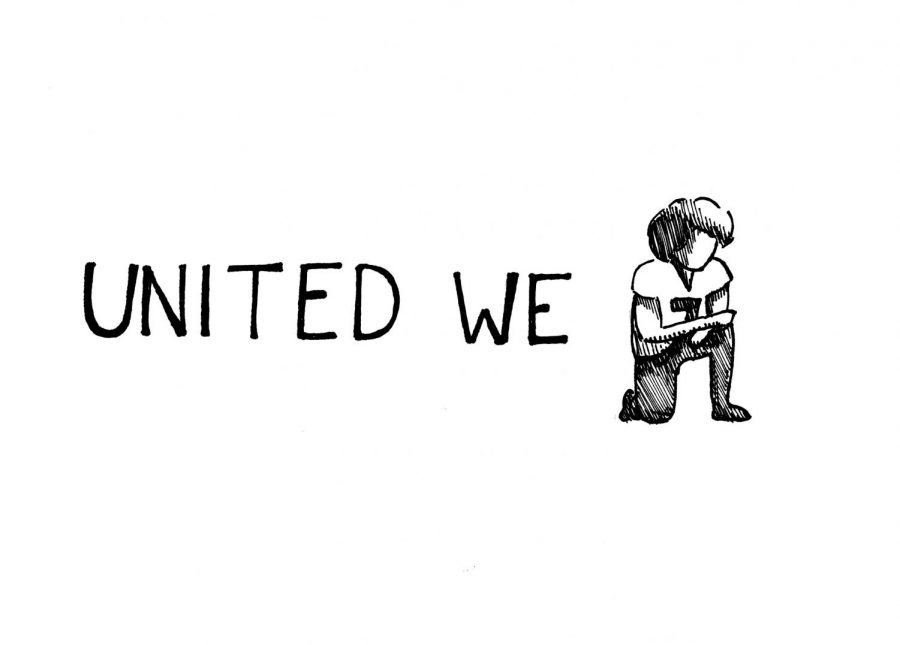EDITORIAL: Students organize in protest of oppression
September 28, 2016
Take a Knee
The Issue: The Major Redz, a student-formed majorette dance team, and other students knelt during the national anthem at the WKU vs. Vanderbilt football game last Saturday.
Our Stance: We stand in solidarity with the Major Redz and other students in their act of protest. We cannot and should not infringe on their right to protest. If anything, we can all learn from this protest, especially the university administration.
While other students stood for the national anthem in Smith Stadium Saturday, Sept. 24, some students kneeled with their arms outstretched and fists clenched. This scene has become more familiar and popularized in the context of sports recently.
The protest was led by the Major Redz who posted on their Instagram page that they kneeled “to show respect to those who have fought/died for this country for the freedoms we do have; but we also kneel because we won’t stand with a country who doesn’t stand to protect its citizens –– all minorities –– blacks.”
By now people have become familiar with the act of taking a knee or refusing to stand during the national anthem as San Francisco 49ers quarterback Colin Kaepernick made headlines for kneeling during the anthem in late August.
Kaepernick told NFL media he is protesting what he deems are “wrongdoings against African Americans and minorities in the United States,” which is what the Major Redz and other students also echoed.
“I am not going to stand up to show pride in a flag for a country that oppresses black people and people of color,” Kaepernick told NFL Media. “To me, this is bigger than football and it would be selfish on my part to look the other way. There are bodies in the street and people getting paid leave and getting away with murder.”
Much of the criticism surrounding Kaepernick refusing to stand stems from a perceived disrespect he must hold for America, or for soldiers at war or veterans who have fought and or died securing the same rights Kaepernick is utilizing in his protest.
Yet even as criticism has piled up, more and more athletes and professional sports teams are following his lead.
Even President Barack Obama defended Kaepernick’s stance saying he was “exercising his constitutional right to make a statement,” as reported by the Los Angeles Times.
So what does this protest by Kaepernick and others really touch on? For the most part, no one seems to be upset people are exercising their right to protest. Brian Kuster, WKU vice president of student affairs, told a Herald reporter it is “their right as a citizen” to do so.
So everyone is in general agreement that the First Amendment gets a thumbs up. After all, the Bill of Rights is typically touted as a positive part of the Constitution.
What the protests of the Major Redz, Kaepernick and others boils down to are opening up discussions about oppression against people of color.
Take a look at what’s happening nationally. Terence Crutcher, 40, was shot Friday, Sept. 16 in Tulsa, Oklahoma, after he reportedly reached into a stalled vehicle in the middle of a Tulsa road instead of complying with officer’s commands to raise his hands, as reported by the Tulsa World.
Crutcher died later that night and since then the Tulsa Police Department has released video of the encounter and officer Betty Shelby was charged with first-degree manslaughter for the shooting of Crutcher but later released on bail, according to the Washington Post.
In the video, Crutcher is seen raising his hands, walking toward a car and then leaning against it.
Crutcher joins 799 others who have been killed by law enforcement in 2016 in the United States, according to The Counted project by The Guardian.
On a local level, you don’t have to look far for forms of oppression against people of color at WKU.
Michelle Jones, assistant dean of University College, who received racist letters slipped underneath her door, is one. Additionally, Lexington senior Cheyenne Mitchell had the n-word carved into her car.
However, this is just what we publicly know. These are the forms of oppression and racism on campus that we can see. It cannot begin to account for everything we don’t know about or can’t see.
Talking about issues of race, police brutality and oppression can be difficult. Especially for people who are not touched by any of this.
These protests are not a means to an end, but rather a beginning. Protests are the signaling of change, never change itself.
WKU should applaud the efforts of the Major Redz and build on this momentum.
If university administration is serious about implementing change and taking action then here’s their gateway, one that is free of “think tanks” and is already engaging students.
If WKU actually wants to engage students at a grassroots level and encourage participation, there needs to be opportunities to “discuss issues of intolerance and the racial tensions” that are happening around us and seek ways to make positive change. This is the opportunity.






















